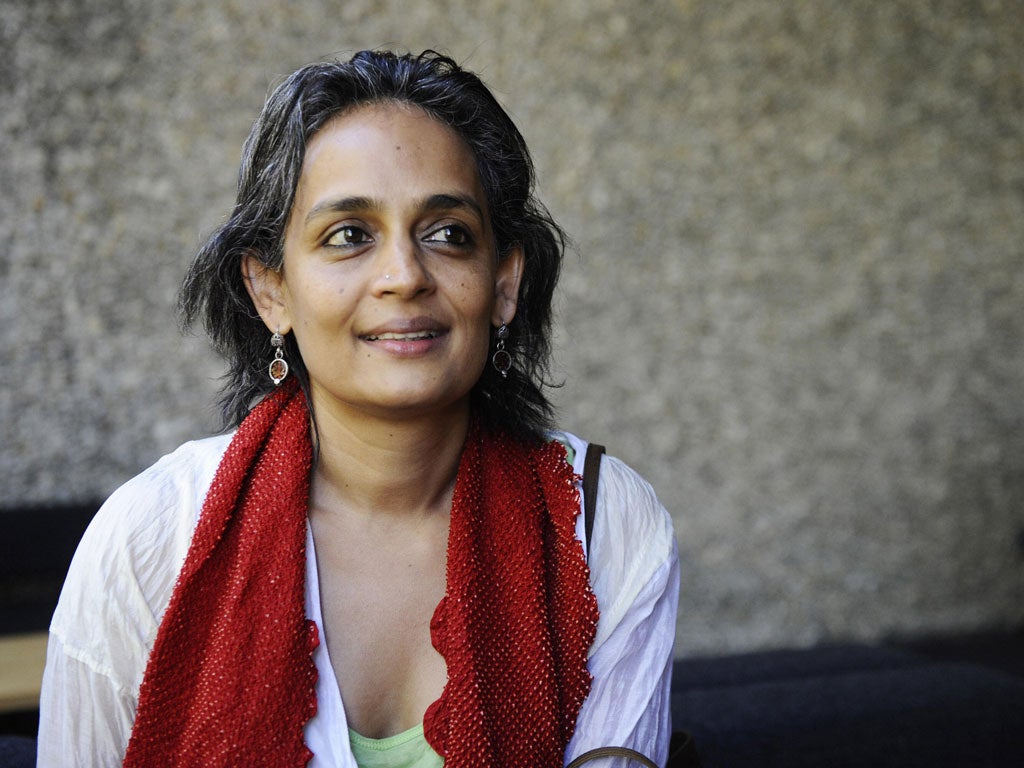Gandhi’s failings and the persecution of a modern-day Indian renegade
There is no more ferociously divisive figure in Indian public life than Arundhati Roy


Arundhati Roy, the Indian activist and novelist, was recently in London, telling an audience at University College last week about Mohandas Gandhi, known to the world as the Mahatma, or “Great Soul”. The founding saint of independent India was not the smiling revolutionary of our imagining but a reactionary who persistently bolstered the caste system in defiance of the other voices – specifically that of Dr B R Ambedkar, the champion of the Dalits, India’s tens of millions of “untouchables” – who demanded the overthrow of caste as a precondition for the subcontinent’s true revival.
Roy may be taking her time producing a second novel – her debut work, The God of Small Things, won the Booker Prize when many in her London audience were still in nappies – but she retains what she demonstrated in that book and in the incendiary non-fiction books and pamphlets she has published since: a uniquely sure touch for tweaking the most sensitive nerves of educated, upper-middle-class India.
Every time she opens her mouth, it hurts. They hate it. There is no more ferociously divisive figure in Indian public life. Argumentative India should be proud that it has produced such a turbulent debater, but it hates her for two reasons: first for identifying the root cause of the national bad conscience – in a nutshell the evils of the caste system, which has been her principal theme from her first book to her most recent; and second, for telling the whole world about this moral disaster zone.
So is she right about Gandhi? In recent years we have learned a lot of seedy facts about the “half-naked fakir” (Churchill’s description), from his ugly relationships with his children to his penchant for testing his powers of self-restraint by chastely sleeping with adolescent girls.
But Roy’s thesis cuts to the chase: far from liberating India, she maintains, he confirmed it in its ugliest, most ancient, most soul-destroying traditions, which condemned vast multitudes to non-human status.
But we have not been wrong to regard Gandhi as a true Indian hero. The confusion arises from the fact that the object of his campaigns was not the Indian conscience but the imperial British one.
Like other educated Indians of his era, he rose to a position of respectability and affluence by following British rules, dancing to imperial tunes, becoming the embodiment of what Macaulay called the “brown Englishman”, a compliant and complicit cog in the machinery of empire.
The trajectory of his life, from wing-collared London-trained lawyer to dhoti-clad pseudo-peasant, was the repudiation of that model – a repudiation and a return to native ethical models that caught the imagination of hundreds of millions. Arundhati Roy fingers with her sure and practised touch the screaming toothache of her middle-class urban Indian peers; Gandhi did the same for the British who patronised and promoted him in his youth, and who then had to see this model subject slip through their fingers and become their arch-accuser.
As Roy herself has discovered from being the object of withering ad personam attacks in the Indian media year after year, the role of moral gadfly is intensely uncomfortable: in both her case and Gandhi’s, the adulation of the poor is more than counterbalanced by the hostility of the powerful, who hold in their hands the tools of practical persecution.
It is however a role – telling truth to power – which society needs as much as the human constitution needs the antibodies that fight viruses: these people are in the moral front line.
Roy is not a religious figure but today, when religion seems more and more an excuse for bigotry and brutality, it can also help to redeem faith as a force for good.
So while the complexities of the form of Buddhism the Dalai Lama represents may be beyond our ken, he merely has to move – or attempt to move – from one country to another to shine a harsh and revealing light on the craven political culture of those destinations.
In September he was supposed to travel to South Africa for the World Summit of Nobel Peace Laureates, which is held in a different country each year. Instead they will shortly be convening in Rome after South Africa – roundly denounced by his friend and fellow peace laureate Archbishop Tutu – refused him a visa, for the third time. Mighty China was doubtless pleased; for the rest of us, Pretoria sank another notch in our esteem.
Pope Francis has rediscovered the role of the pontiff telling inconvenient moral truth: for example, the simple, blindingly obvious but extremely awkward fact that allowing thousands of would-be refugees to drown while attempting to reach our shores in rickety boats is morally inexcusable when it is in our power to stop it.
In the past year Italy acted on this moral imperative, rescuing more than 150,000 from the sea. In the process it not only spent a lot of money but landed itself with a social and political problem in embryo. But as Francis himself would doubtless argue, that is not the point. It is a rare event when what is good and what is convenient coincide.
Most of the time, the good – infuriating China to make a point about the Tibetan right to self-determination; infuriating Indian Brahmins to bring home the fact that their pre-eminence is founded on ancient injustice – is highly inconvenient. That doesn’t alter the fact that it is good.

Join our commenting forum
Join thought-provoking conversations, follow other Independent readers and see their replies